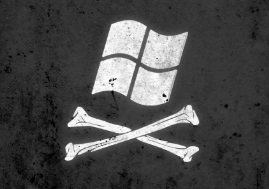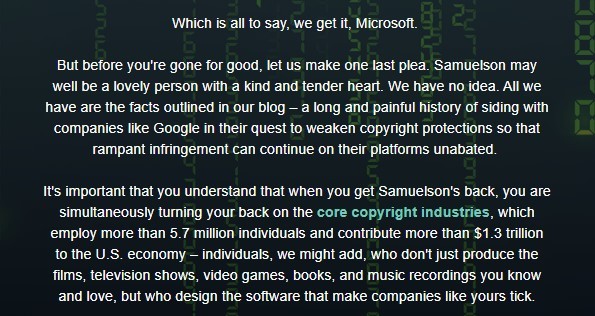
In recent years CreativeFuture has been one of the most vocal anti-piracy groups.
The coalition is made up of more than 550 organizations as well as hundreds of thousands of individual creators.
The group lobbies lawmakers and leads the charge when it comes to many anti-piracy discussions. Its message is loud and clear: piracy is terrible and Google is enemy number one.
In recent years CreativeFuture has repeatedly pitted itself against major technology companies which it believes don’t do enough to curb piracy. In this often hostile ecosystem, it found one sole tech giant at its side, Microsoft.
“In an era of creative decimation perpetrated by the world’s biggest technology companies, one of their very biggest made a point of joining us to stand up for copyright,” CreativeFuture noted in a recent mailing.
While that sounds positive, the reason for the email isn’t good. The anti-piracy coalition explains that Microsoft is the first member to ever leave the group. While the company hasn’t publicly explained its motives, CreativeFuture knows why.
According to the mailing, Microsoft wasn’t happy with an article the group wrote about Pamela Samuelson, the new Board Chair at the Electronic Frontier Foundation (EFF).
CreativeFuture and EFF often find themselves at odds and the former has repeatedly criticized the digital rights group. In its most recent article, CreativeFuture highlights what it calls Samuelson’s “miserable copyright record.”
This apparently went a step too far for Microsoft. While the company probably hoped to keep its disagreement out of public view, CreativeFuture decided otherwise, going on the attack.
“Confused and hurt, we did some digging, and discovered that Samuelson and Microsoft have a long history together, going at least as far back as 2005, when Microsoft gifted a whopping $1 million to the Samuelson Law, Technology & Public Policy Clinic at UC Berkeley,” CreativeFuture writes.
In addition, the coalition points out that Samuelson published a paper defending Microsoft in a lawsuit against AT&T, while the tech company continued to support the Samuelson Clinic.
CreativeFuture says that it “gets it” and that Samuelson may be a “lovely person with a kind and tender heart.” However, it notes that by backing her, the company is turning its back “on the core copyright industries,” including many software developers.
“As one of the world’s most innovative companies, Microsoft, you should know better than anyone that copyright is the fuel of innovation in this country, the assurance that innovators will be compensated for doing their important work.
“From this perspective, your relationship with Pamela Samuelson is ultimately a kind of self-sabotage, an attack on the very values that have helped your company thrive,” CreativeFuture adds.

CreativeFuture says it’s sad to see Microsoft go. It will continue its anti-piracy quest and hopes that the tech giant will one day rejoin. However, considering its scathing letter, that’s very unlikely.
We don’t know Microsoft’s exact reasons for leaving. Perhaps the arguments against Samuelson weren’t the problem as much as the fact that it was made personal. Personal attacks can be quite effective and fuel most of the online discourse today, but they may not fit Microsoft’s image.
That said, it may also be that Microsoft no longer sees fit to support CreativeFuture, as it has interests and allies on the other side as well. That’s certainly not uncommon and happens on both sides of the copyright/technology divide.
For example, when we researched an unrelated article, we noticed that Netflix has left the Internet Association, which is critical of stringent copyright legislation. While no reason was mentioned, Netflix’s departure took place late last year, just a few weeks before it joined the Motion Picture Association.
Whatever Microsoft’s precise motives are, the company can be assured that CreativeFuture will keep a close eye on its copyright track record going forward.





